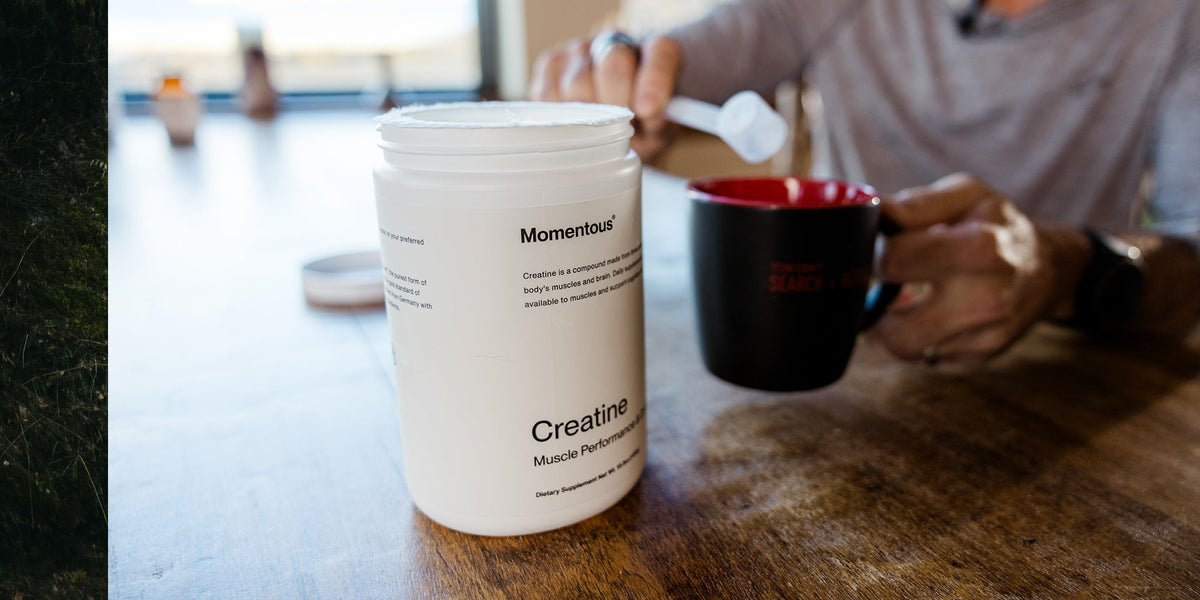
Creapure® vs Creatine: The Key Differences to Know
|
|
While creatine has become a ubiquitous supplement, a new name you’ve likely heard popping up with it is Creapure®.
The primary difference between Creapure and creatine is where it’s manufactured and the standards used to manufacture it. Creapure is also a brand of creatine.
But there’s a lot more that most people should know about when it comes to choosing between Creapure and other creatine supplements. This article will explore the nuances between creatine and Creapure to help you choose the best creatine product for your goals.
Creatine is a compound made from three amino acids (arginine, glycine, and methionine) and is stored in the body's muscles and brain. It is a natural source of energy that helps your muscles contract, especially while you’re exercising.
Although it is commonly viewed as a supplement to increase lean muscle mass and strength, research shows it may also help support cognitive function.
Your body primarily stores creatine as phosphocreatine in your muscles, where it's used for energy. Phosphocreatine aids the formation of adenosine triphosphate (ATP), the key molecule your cells use for energy and all basic life functions.
During exercise, ATP is broken down to produce energy. The rate of ATP resynthesis limits your ability to continually perform at maximum intensity, as you use ATP faster than you reproduce it.
Creatine supplements can increase your creatine stores, allowing you to produce more ATP energy to fuel your muscles during high-intensity exercise and improve your exercise performance.
The physical benefits of creatine are well documented and include improved muscle strength and power, muscle growth, enhanced recovery, and improved energy levels.
There are several forms of creatine supplements, each with unique characteristics, with the most popular being:
Creatine monohydrate: The most common and well-researched form known for its effectiveness in improving performance and recovery.
Creatine hydrochloride (HCL): A more soluble form, requiring smaller doses with potentially fewer gastrointestinal side effects.
Micronized creatine: A smaller particle size version of monohydrate for better solubility and absorption.
Creapure is the brand name for pure creatine monohydrate, produced by German company Alzchem. While much of the world’s creatine comes from China, Creapure is manufactured at Alzchem’s facilities in Trostberg, Germany.
It is the most widely studied form of creatine and is proven to be safe and effective. It is certified vegan and exclusively manufactured by chemical synthesis. Raw materials and intermediates are not derived from animal or herbal products, resulting in no traces that may have originated from animal or herbal byproducts. The production of Creapure is FSSC 22000 certified, a quality standard recognized by the Food Safety System Certification.
| Creapure | Creatine | |
|---|---|---|
| Manufactured in | Germany | Majority sourced from China |
| Certifications/Testing | Cologne List; ISO-Norms; IFS FOOD; FSSC 22000 | Few are tested for purity, safety, and efficacy |
| Dietary Certifications | Vegan; Kosher; Halal | Unknown |
| Price | More expensive | More affordable |
Manufactured In
While much of the world’s creatine is sourced from China, Creapure is manufactured in Germany at a specially designed production facility where the entire manufacturing process undergoes rigorous testing and certification.
Certifications/Testing
Creapure is proven to be safe and effective. The production of Creapure is FSSC 22000 certified, a quality standard recognized by the Food Safety System Certification. In addition, it is on the Cologne List, which is an international quality assurance program that tests and certifies dietary supplements for minimal risk of contamination with banned substances.
Inclusion on the list means a product has been independently tested and deemed to have a significantly reduced doping risk, offering athletes greater confidence in its safety and compliance.
Dietary Certifications
Creapure is produced in compliance with Jewish and Muslim food regulations and is both Kosher and Halal certified. Few other types of creatine have dietary certifications.
Price
Given the extensive testing and certification that is undertaken for Creapure, it is typically more expensive than other brands of creatine.
Active ingredients: Both Creapure and creatine contain the same active ingredient, namely creatine.
Benefits: Both provide the same functional benefits, such as enhanced athletic performance, strength and power gains, improved recovery, and cognitive support.
Daily dosage: The daily dosage is typically similar—3 to 5 grams of creatine per day for regular usage.
Solubility: Both have similar solubility and can be mixed easily into water or your protein shake or preferred beverage.
If you’re looking for a quality creatine monohydrate sourced from Creapure, check out Momentous Creatine.
Our creatine is one of our best sellers and is known for its purity, efficacy, and safety. There are zero additives, sweeteners, or other ingredients. It’s also NSF and Informed Sport Certified.
What customers are saying about Momentous Creatine:
“I add this every morning to my smoothie, along with the Momentous Collagen and Protein. The certification for this makes me feel so confident in the efficacy of the product.”
-Theresa C.
“Creatine has been fantastic for enhancing strength and endurance during workouts, supporting muscle recovery effectively. Has also contributed to sharper focus throughout the day.”
-Robert S.